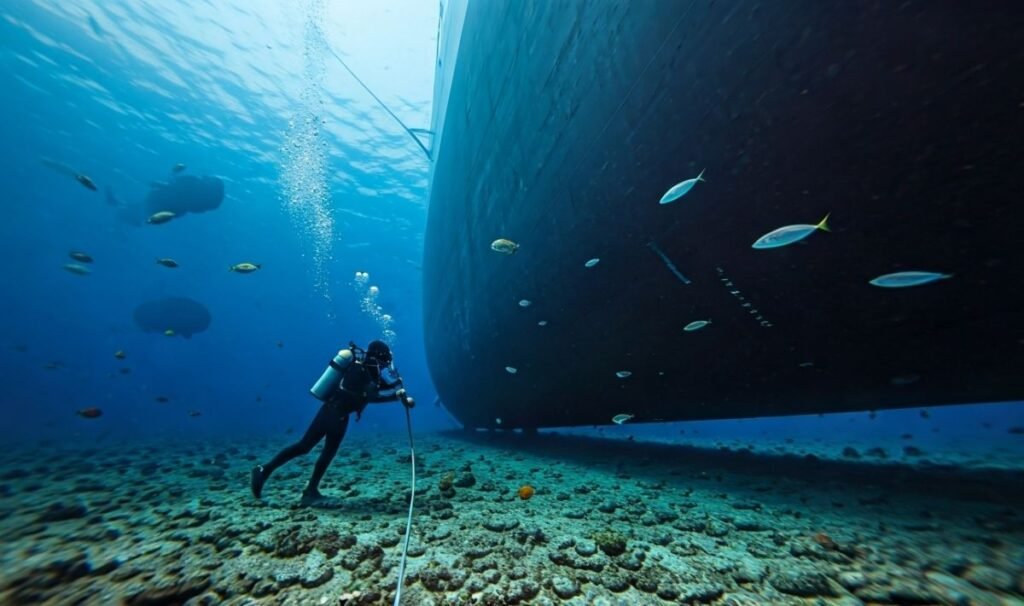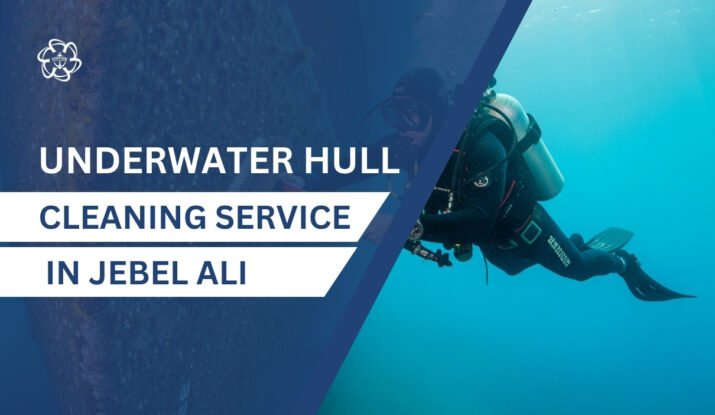Why Underwater Hull Cleaning in Jebel Ali is a Maritime Necessity
Imagine a sprinter running with weights tied to their legs. That’s exactly how a ship performs when its hull is covered with marine growth. Underwater hull cleaning isn’t just cosmetic—it’s a crucial maintenance task that keeps ships operating at peak efficiency, especially in bustling trade zones like Jebel Ali Port.
Whether you’re managing cargo carriers, oil tankers, or container ships, neglecting the hull is like ignoring your engine’s check engine light.
Understanding Underwater Hull Cleaning Jebel Ali Port and Its Strategic Significance
Jebel Ali Port, located in Dubai, UAE, is not just another port—it’s one of the busiest and most advanced in the Middle East. Operated by DP World, it’s:
- The largest man-made harbor in the world
- A key link in the global shipping chain
- A major refueling and logistics hub for ships navigating between Europe, Asia, and Africa
With such high marine traffic and tight turnaround times, operational delays are unacceptable. Even a slight drag on hull performance can lead to higher costs, schedule disruptions, and environmental violations—a nightmare for fleet managers.
What is Underwater Hull Cleaning in Jebel Ali? A Deep Dive
Underwater hull cleaning in Jebel Ali refers to the removal of biological and inorganic buildup—barnacles, algae, slime, mollusks—from the ship’s submerged surface. These unwanted passengers cause “biofouling”, which interferes with the ship’s hydrodynamics.

Instead of hauling the vessel into dry dock, specialized divers or remotely operated vehicles (ROVs) perform cleaning while the ship remains afloat. It’s fast, cost-efficient, and avoids unnecessary downtime.
The Consequences of Biofouling on Ship Performance
Biofouling may look harmless, but its effects are severe. Here’s how it silently eats away at your operational efficiency:
- Fuel Consumption Increases: A fouled hull can increase drag by 60%, raising fuel use by 30–40%.
- Speed Reduction: Ships with heavy biofouling move significantly slower.
- CO₂ Emissions Rise: More fuel means more emissions—bad news for carbon credits and the environment.
- Damage to Coatings: Fouling organisms weaken protective coatings, reducing their lifespan.
- Cross-Contamination Risk: Marine species can be transported between regions, disrupting ecosystems.
In Jebel Ali’s warm waters, marine growth is rapid—especially for vessels idle for extended periods—making regular cleaning essential.
The Underwater Hull Cleaning in jebel Ali Process Explained Step-by-Step
Let’s break down what happens during an underwater hull cleaning in Jebel Ali operation:
Inspection and Assessment
- Certified divers or ROVs survey the hull.
- High-definition video and sonar tools map fouling density.
- A cleaning plan is customized based on vessel size and biofouling level.
Pre-Cleaning Protocols
- Safety checks and communication systems are tested.
- Coordination with Jebel Ali Port Authority is confirmed.
- Protective barriers are set up to contain debris if required.
Cleaning Execution
- Hydraulic brushes, scrapers, or cavitation tools remove slime and growth.
- Propeller and sea chests are cleaned with extra care.
- Divers work in teams with constant surface support.
Post-Cleaning Evaluation
- Final inspection ensures thorough cleaning.
- Any damage is documented for reporting.
- A detailed report is submitted for compliance and records.
This entire operation is usually wrapped up in under 10 hours for most commercial vessels.
Key Equipment and Technologies Used in Underwater Hull Cleaning in Jebel Ali
The underwater cleaning industry has evolved. At Jebel Ali, providers deploy:
- ROVs (Remotely Operated Vehicles) – Equipped with cameras and brushes for minimal diver intervention.
- Magnetic Hull Cleaners – Stick to hull surfaces for vertical cleaning.
- Cavitation Technology – Uses pressure waves to lift fouling without damaging paint.
- Rotary Brush Systems – Designed to clean large flat hull surfaces quickly.
- Ultrasonic Hull Monitoring Sensors – Track fouling buildup in real-time.
These tools improve precision, reduce human risk, and enhance cleaning efficiency without harming the marine environment.
Regulatory Framework: Compliance at Jebel Ali Port
Jebel Ali is governed by UAE federal laws and international standards, like:
- IMO Guidelines (MEPC 207/62)
- Biofouling Management Plans (BMPs)
- Port State Control (PSC) Regulations
- Dubai Maritime City Authority (DMCA) Compliance
Failure to comply can result in:
- Hefty fines
- Detention of vessels
- Banned entry in future voyages
That’s why working with licensed service providers who know the local regulations is critical.
Economic and Environmental Benefits of Regular Cleaning
Underwater hull cleaning in Jebel Ali offers a solid return on investment:
- Fuel Savings: Ships can save up to $500,000 annually on fuel with regular cleaning.
- Reduced Dry Docking: In-water services reduce the need for costly dry dock sessions.
- Extended Hull Life: Less corrosion and stress mean fewer repairs.
- Eco-Friendly Operations: Less fuel means lower emissions, a win for green shipping.
Environmental agencies now encourage in-water cleaning when done responsibly, particularly with waste capture systems.
Selecting the Right Hull Cleaning Provider in Jebel Ali
Not all cleaning services are created equal. Here’s what to look for:
- ✅ Port-Approved Service Provider
- ✅ Trained and Certified Technicians
- ✅ 24/7 Emergency Availability
- ✅ Use of Non-Abrasive Equipment
- ✅ Insurance and Damage Liability Coverage
- ✅ Digital Inspection Reports for Your Records
One reputed provider is CleanShip.co, known for their advanced tech-driven solutions, strict compliance, and fast turnaround in the UAE region.
Best Time and Frequency for Hull Cleaning in the Gulf Region
In the warm, nutrient-rich waters of the Persian Gulf, hull fouling is fast and aggressive. Experts recommend:
- Lightly used ships: Every 3–4 months
- Active cargo vessels: Every 6–8 weeks
- Before entering eco-sensitive or high-regulation zones
- Before surveys, audits, or dry docking
Scheduling cleanings during loading/unloading or anchorage waits can save precious time and avoid operational disruptions.
Challenges Faced During Underwater Hull Cleaning in Jebel Ali
Despite its benefits, underwater cleaning isn’t without hurdles:
- Limited visibility in murky or nighttime conditions
- Safety risks for divers near ship intakes or propellers
- Thermal stress due to Gulf temperatures
- Obtaining timely permits from port authorities
- Avoiding disturbance to marine life
That’s why professional coordination and experience are a must in a port as tightly regulated as Jebel Ali.
Future of Hull Maintenance: Robotics and AI
Looking ahead, the industry is leaning toward automation:
- AI-Driven Drones – Capable of autonomous cleaning and data collection
- Hull Mapping with Machine Learning – Predicts fouling patterns for optimized scheduling
- Eco-Friendly Detergents – Biodegradable solutions under development
- Blockchain Maintenance Logs – For secure compliance tracking
Jebel Ali, with its modern infrastructure, is expected to become a testing ground for such innovations.
Conclusion
Underwater hull cleaning in Jebel Ali is not just smart—it’s strategic. In a port known for its speed, regulation, and scale, a dirty hull can sink more than just performance—it can impact your entire bottom line.
By staying proactive with hull maintenance, vessel operators can lower operational costs, reduce emissions, meet international standards, and maximize vessel lifespan. It’s about sailing smarter, not harder.
If you’re navigating through Jebel Ali, make underwater hull cleaning in Jebel Ali part of your operational checklist—and sail clean into the future.
FAQ:
Q1. Can underwater hull cleaning in Jebel Ali damage antifouling paint?
Not if done by certified professionals using the correct tools. It can help extend the coating’s life by removing harmful organisms early.
Q2. Is in-water hull cleaning permitted during port stay in Jebel Ali?
Yes, but only with pre-approval from Jebel Ali Port Authority and under environmental protection guidelines.
Q3. How much marine growth is “too much”?
If you notice increased fuel usage, slower speeds, or visible slime/barnacles during inspection, it’s time for cleaning.
Q4. Are there eco-friendly Services in underwater hull cleaning in Jebel Ali?
Yes! Many companies use cavitation or soft-brush technologies along with waste capture systems to protect the marine ecosystem.
Q5. What documentation do I get after a cleaning job?
Professional providers issue detailed pre/post inspection reports, photos/videos, compliance forms, and cleaning certificates.


